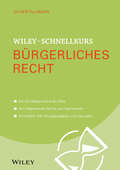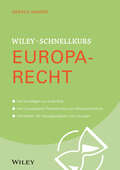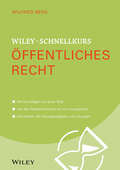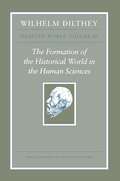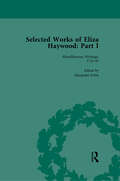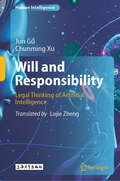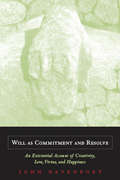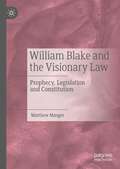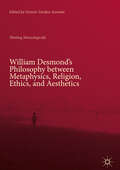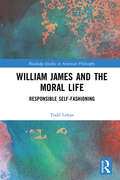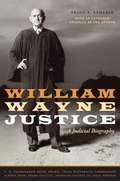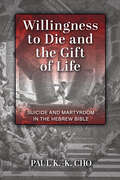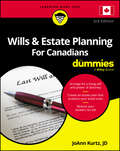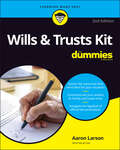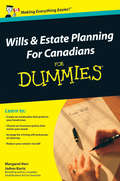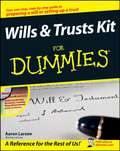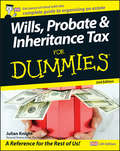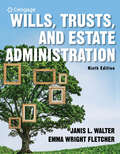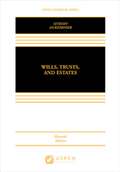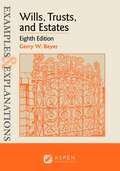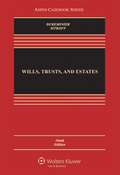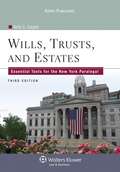- Table View
- List View
Wiley-Schnellkurs Bürgerliches Recht (Wiley Schnellkurs)
by Oliver TillmannIm Studium kommen Sie am Bürgerlichen Recht kaum vorbei und das zu Recht: Es ist eben nunmal wichtig. Oliver Tillmann erklärt Ihnen die Systematik des BGB und was Sie zum Allgemeinen Teil wissen sollten. Hier erfahren Sie, das Wichtigste zu Willenserklärungen, Verträge, Stellvertretung, Rechts- und Geschäftsfähigkeit. Außerdem führt er Sie in das Schuldrecht und das Sachenrecht ein. Kursorisch streift er gegen Ende des Buches auch noch das Familien- und Erbrecht. Zahlreiche Übungsaufgaben mit Lösungen helfen Ihnen, Ihr Wissen zu testen und zu festigen.
Wiley-Schnellkurs Europarecht (Wiley Schnellkurs)
by Gerald SanderEuroparecht beschäftigt sich mit den rechtlichen Grundlagen der Europäischen Union. Gerald Sander liefert Ihnen einen schnellen à berblick über die Organe der EU wie das Europäische Pralament, die Europäische Kommission und die EZB. Auà erdem erläutert er, welche Rechtsquellen das Europarecht hat, welche Verfahren es gibt, was es mit der Wirtschafts- und Währungsunion auf sich hat und vieles mehr. Mit à bungsaufgaben mit Lösungen können Sie sich selbst testen und Ihr Wissen festigen.
Wiley-Schnellkurs Öffentliches Recht (Wiley Schnellkurs)
by Wilfried BergDieses Buch hilft Ihnen, wenn Sie schon immer wissen wollten oder für eine Prüfung wissenmüssen, wie die Bundesrepublik von Rechts wegen her funktioniert. Wilfried Berg erklärt Ihnen, was Sie über Verfassung und Verwaltungsrecht wissen sollten. Das geht von den Funktionen der Staatsorgane,über die Grundrechte bis zum Verwaltungsverfahren. Kapitel zum Verwaltungsprozessrecht, wie auch zur Europäischen Union runden das Buch ab. So ist das Buch eine schnelle Hilfe für Sie, wenn Sie sich einen Überblick über unser Staatswesen verschaffen wollen.
Wilhelm Dilthey: The Formation of the Historical World in the Human Sciences
by Wilhelm DiltheyThis volume provides Dilthey's most mature and best formulation of his Critique of Historical Reason. It begins with three "Studies Toward the Foundation of the Human Sciences," in which Dilthey refashions Husserlian concepts to describe the basic structures of consciousness relevant to historical understanding.The volume next presents the major 1910 work The Formation of the Historical World in the Human Sciences. Here Dilthey considers the degree to which carriers of history--individuals, cultures, institutions, and communities--can be articulated as productive systems capable of generating value and meaning and of realizing purposes. Hegel's idea of objective spirit is reconceived in a more empirical form to designate the medium of commonality in which historical beings are immersed. Any universal claims about history need to be framed within the specific productive systems analyzed by the various human sciences. Dilthey's drafts for the Continuation of the Formation contain extensive discussions of the categories most important for our knowledge of historical life: meaning, value, purpose, time, and development. He also examines the contributions of autobiography to historical understanding and of biography to scientific history.The finest summary of Dilthey's views on hermeneutics can be found in "The Understanding of Other Persons and Their Manifestations of Life." Here, Dilthey differentiates understanding relative to three kinds of manifestations of life. After giving his analysis of elementary understanding, he examines the role of induction in higher understanding and interpretation, and the relevance of transposition and re-experiencing for grasping individuality.
Will Sustainability Fly?: Aviation Fuel Options in a Low-Carbon World
by Walter J. PalmerWhile international negotiations to reduce greenhouse gas (GHG) emissions have been less than satisfactory, there is a presumption that a significant level of multi-lateral commitment will be realized at some point. International air and marine travel have been left to one side in past talks because the pursuit of agreement proceeds on the basis of commitment by sovereign nations and the effects of these specific commercial activities are, by their nature, difficult to corral and assign to specific national jurisdictions. However, air travel is increasing and, unless something is done, emissions from this segment of our world economy will form a progressively larger percentage of the total, especially as emissions fall in other activities. This book focuses on fuel. The aim is to provide background in technical and policy terms, from the broadest reliable sources of information available, for the necessary discourse on society's reaction to the evolving aviation emissions profile. It considers what policy has been, why and how commercial air travel is committed to its current liquid fuel, how that fuel can be made without using fossil-source materials, and the barriers to change. It also advances some elements of policy remedies that make sense in providing an environmentally and economically sound way forward in a context that comprehends a more complete vision of sustainability than 'renewable fuels' traditionally have. The goal of Will Sustainability Fly? is to broaden and contextualize the knowledge resource available to academics, policy makers, air industry leaders and stakeholders, and interested members of the public.
Will Sustainability Fly?: Aviation Fuel Options in a Low-Carbon World
by Walter J. PalmerWhile international negotiations to reduce greenhouse gas (GHG) emissions have been less than satisfactory, there is a presumption that a significant level of multi-lateral commitment will be realized at some point. International air and marine travel have been left to one side in past talks because the pursuit of agreement proceeds on the basis of commitment by sovereign nations and the effects of these specific commercial activities are, by their nature, difficult to corral and assign to specific national jurisdictions. However, air travel is increasing and, unless something is done, emissions from this segment of our world economy will form a progressively larger percentage of the total, especially as emissions fall in other activities. This book focuses on fuel. The aim is to provide background in technical and policy terms, from the broadest reliable sources of information available, for the necessary discourse on society's reaction to the evolving aviation emissions profile. It considers what policy has been, why and how commercial air travel is committed to its current liquid fuel, how that fuel can be made without using fossil-source materials, and the barriers to change. It also advances some elements of policy remedies that make sense in providing an environmentally and economically sound way forward in a context that comprehends a more complete vision of sustainability than 'renewable fuels' traditionally have. The goal of Will Sustainability Fly? is to broaden and contextualize the knowledge resource available to academics, policy makers, air industry leaders and stakeholders, and interested members of the public.
Will and Responsibility: Legal Thinking of Artificial Intelligence (Human Intelligence)
by Chunming Xu Jun GuThis book explores the authors' legal thinking on artificial intelligence (AI), a topic of burgeoning interest in the technology sector and among the general public. As part of the Human Intelligence book series, it primarily addresses the legislative and philosophical challenges posed by AI technology. A key philosophical concern discussed is the implications of AI surpassing human intelligence in certain domains, particularly the definition of rights and responsibilities for robots. Without clear resolutions to these issues, the deployment of AI technology may face significant hurdles. The book covers various aspects, including the legal recognition of robots as rights-holders, strategies for implementing these rights, assigning responsibilities to robots, intellectual property rights for robotic inventions, personality rights for companion robots, and an evaluation of the pros and cons of a binary legal system.
Will as Commitment and Resolve: An Existential Account of Creativity, Love, Virtue, and Happiness
by John J. DavenportIn contemporary philosophy, the will is often regarded as a sheer philosophical fiction. In Will as Commitment and Resolve, Davenport argues not only that the will is the central power of human agency that makes decisions and forms intentions but also that it includes the capacity to generate new motivation different in structure from prepurposive desires. The concept of "projective motivation" is the central innovation in Davenport's existential account of the everyday notion of striving will. Beginning with the contrast between "eastern" and "western" attitudes toward assertive willing, Davenport traces the lineage of the idea of projective motivation from NeoPlatonic and Christian conceptions of divine motivation to Scotus, Kant, Marx, Arendt, and Levinas. Rich with historical detail, this book includes an extended examination of Platonic and Aristotelian eudaimonist theories of human motivation. Drawing on contemporary critiques of egoism, Davenport argues that happiness is primarily a byproduct of activities and pursuits aimed at other agent-transcending goods for their own sake. In particular, the motives in virtues and in the practices as defined by Alasdair MacIntyre are projective rather than eudaimonist. This theory is supported by analyses of radical evil, accounts of intrinsic motivation in existential psychology, and contemporary theories of identity-forming commitment in analytic moral psychology. Following Viktor Frankl, Joseph Raz, and others, Davenport argues that Harry Frankfurt's conception of caring requires objective values worth caring about, which serve as rational grounds for projecting new final ends. The argument concludes with a taxonomy of values or goods, devotion to which can make life meaningful for us.
William Blake and the Visionary Law: Prophecy, Legislation and Constitution
by Matthew MaugerThis book examines the difficult relationship between individual intellectual freedom and the legal structures which govern human societies in William Blake’s works, showing that this tension carries a political urgency that has not yet been recognised by scholars in the field. In doing so, it offers a new approach to Blake’s corpus that builds on the literary and cultural historical work of recent decades. Blake’s pronouncements about law may often sound biblical in tone; but this book argues that they directly address (and are informed by) eighteenth-century legal debates concerning the origin of the English common law, the autonomy of the judicature, the increasing legislative role of Parliament, and the emergence of the notions of constitutionalism and natural rights. Through a study of his illuminated books, manuscript works, notebook drafts and annotations, this study considers Blake’s understanding that law is both integral to humanity itself and a core component of its potential fulfilment of the ‘Human Form Divine’.
William Desmond’s Philosophy between Metaphysics, Religion, Ethics, and Aesthetics: Thinking Metaxologically
by Dennis Vanden AuweeleThis volume collects seventeen new essays by well-established and junior scholars on the philosophical relevance of metaxological philosophy and its main proponent, William Desmond. The volume mines metaxological thought for its salience in contemporary discussions in Continental philosophy, specifically in the fields of metaphysics, philosophy of religion, ethics, and aesthetics. Among others, topics under discussion include the goodness of being, the existence and nature of God, and the aesthetic dimensions of human becoming. Interest in metaxological philosophy has been on the rise in recent years, and this volume provides both a practical introduction and thorough engagements with it by experts in the field. The volume concludes with a series of responses by William Desmond on the issues raised by the contributors.
William James and the Moral Life: Responsible Self-Fashioning (Routledge Studies in American Philosophy)
by Todd LekanThis book offers a compelling new interpretation of James’ moral philosophy: an "ethics of responsible self-fashioning." James’ performative writing style articulates this conception by showing how moral inquiry serves both social and personal transformation. James the social moral philosopher seeks to create an inclusive moral order through expansion of sympathetic concern among those committed to different ideals. James the existential moral philosopher defends the right to adopt hope-grounding metaphysical beliefs which encourage strenuous moral action in the face of evil and suffering. The power of James’ ethics is demonstrated by its application to current discussions about the status of marginalized nonhuman animals and that of the cognitively disabled. William James and the Moral Life is of interest to a wide variety of ethicists and has special appeal to scholars and advanced students in moral philosophy, social philosophy, pragmatism, and American philosophy.
William James on Ethics and Faith
by Michael R. SlaterThis book offers a new interpretation of William James's ethical and religious thought. Michael Slater shows that James's conception of morality, or what it means to lead a moral and flourishing life, is intimately tied to his conception of religious faith, and argues that James's views on these matters are worthy of our consideration. He offers a reassessment of James's 'will to believe' or 'right to believe' doctrine, his moral theory, and his neglected moral arguments for religious faith. And he argues that James's pragmatic account of religion is based on an ethical view of the function of religion and a realist view of the objects of religious belief and experience, and is compatible with his larger conception of pragmatism. The book will appeal to readers interested in the history of modern philosophy, especially pragmatism, as well as those interested in moral philosophy, religion, and the history of ideas.
William M. Kunstler: The Most Hated Lawyer in America
by David J. LangumThe true story of the defender of the Chicago 7Alternately vilified as a publicity-seeking egoist and lauded as a rambunctious, fearless advocate, William Kunstler consistently embodied both of these qualities. Kunstler's unrelenting, radical critique of American racism and the legal system took shape as a result of his efforts to enlist the federal judicial system to support the civil rights movement. In the late 60s and the 70s, Kunstler, refocusing his attention on the Black Power and anti-war movement, garnered considerable public attention as defender of the Chicago Seven, and went on to represent such controversial figures as Leonard Peltier, the American Indian Movement leader charged with killing an FBI agent, and Jack Ruby, the killer of Lee Harvey Oswald. Later, Kunstler briefly represented Colin Ferguson, the Long Island Railroad mass murderer, outraging fans and detractors alike with his invocation of the infamous "black rage" defense. Defending those most loathed by mainstream, conventional America, William Kunstler delighted in taking on fiercely political cases, usually representing society's outcasts and pariahs free of charge and often achieving remarkable courtroom results in seemingly hopeless cases. Though Kunstler never gave up his revolutionary underpinnings, he gradually turned from defending clients whose political beliefs he personally supported to taking on apolitical clients, falling back on the broad rationale that his was a general struggle against an oppressive government. What ideological and tactical motives explain Kunstler's obsessive craving for media attention, his rhetorical flourishes in the courtroom and his instinctive and relentless drive for action? How did Kunstler migrate from a comfortable middle-class background to a life as a staunchly rebellious figure in social and legal history? David Langum's portrait gives depth to the already notorious breadth of William Kunstler's life.
William Wayne Justice: A Judicial Biography
by Kemerer Frank R.In his forty years on the federal bench in Texas, William Wayne Justice has been a formidable force for change. His rulings have prompted significant institutional reforms in education, prisons, and racial relations, to name only a few areas of society in Texas and beyond that have been affected by Justice's work. For his labors, Judge Justice has received numerous awards, including the Outstanding Federal Trial Judge Award, the Thurgood Marshall Award from the Section on Individual Rights and Responsibilities of the American Bar Association, and the Morris Dees Justice Award from the University of Alabama School of Law. This paperback reprint of William Wayne Justice chronicles his judicial career and the decisions he reached. It includes a new epilogue that describes Justice's move to Austin as a judge on senior status yet with a full caseload, tracks the long-running institutional reform cases to their conclusion, and examines the legacy of this remarkable and controversial jurist.
Willingness to Die and the Gift of Life: Suicide and Martyrdom in the Hebrew Bible
by Paul K.-K. ChoOne particularly challenging aspect of the Hebrew Bible is its treatment of various forms of voluntary death: suicide, suicide attack, martyrdom, and self-sacrifice. How can people of faith make sense of the ways biblical literature at times valorizes these sensitive and painful topics? Willingness to Die and the Gift of Life surveys a diverse selection of Hebrew Bible narratives that feature characters who express a willingness to die, including Moses, Judah, Samson, Esther, Job, Daniel, and the &“suffering servant&” of Isaiah 53. The challenging truth uncovered is that the Hebrew Bible, while taking seriously the darker aspects of voluntary death, nevertheless time and again valorizes the willingness to die—particularly when it is for the sake of the group or in faithful commitment to God. Many biblical authors go so far as to suggest that death willingly embraced can unlock immense power: endowing the willing with the charism necessary to lead, opening the possibility of salvation, and even paving the way for resurrection into a new, more glorious life. Paul K.-K. Cho&’s unflinching analysis raises and wrestles with provocative questions about religious extremism, violent terrorism, and suicidal ideation —all of which carry significant implications for the biblically grounded life of faith today. Cho carefully situates the surveyed texts in their original cultural context, discussing relevant topics such the shame and honor culture of ancient Israel and the importance attached to the group over the individual. Closing with an epilogue that reflects on the surprising issue of whether biblical authors considered God to be capable of dying or being willing to die, Cho&’s fascinating study showcases the multifaceted relationship between death and life in the Hebrew Bible.
Wills & Estate Planning For Canadians For Dummies
by JoAnn KurtzPractical advice as you prepare to leave your legacy You’ve worked your entire life to give your loved ones the best life they can have. Don’t let death be the end of your caring and thoughtfulness. You can make sure your family is taken care of after your death and your wealth and assets go where you intend with the help of Wills & Estate Planning For Canadians For Dummies. This down-to-earth guide takes some of the stress and uncertainty out of this unpleasant topic by offering straightforward advice about preparing end-of-life documents and planning your estate. Discover the best way to transfer your assets to your heirs and the charitable organizations of your choice. Find out how to prepare a living will, donate organs, and give instructions for your burial. You also get expanded information about family law in Canada, details on why you need a power of attorney, and guidance on will preparation, funeral planning, green burials, tax implications, and more. Understand the laws surrounding estates, wills, trusts, and taxes in Canada Get details on buying life insurance, naming your heirs and beneficiaries, and designating an executor Find advice for discussing inheritance matters with a legal professional when you have a tricky situation Put your mind at ease with a solid plan for your assets and your end-of-life careThanks to practical advice from an expert author, you can ensure that your affairs are in order and your loved ones will honor your final wishes. Wills & Estate Planning For Canadians For Dummies will help you leave behind a meaningful legacy for all who know and love you.
Wills & Trusts Kit For Dummies
by LarsonEnjoy peace of mind knowing that your assets will pass to your family according to your wishes Regardless of your age or income, writing a legal will is one of the greatest gifts you can give your family. But where do you begin? Wills & Trusts Kit For Dummies walks you through the most important considerations to have in mind when you’re deciding what will happen to your estate when you’re gone. Writing a will or setting up a trust isn’t as fun as binge watching the latest hot web series, but this book makes the task a little less daunting. Find out who needs a will or trust (spoiler alert: everyone!), when you should create one, and how to take the first steps. Handy online content includes practical worksheets, forms, and templates that simplify and explain the process of estate planning in language that doesn’t require a legal education to understand. With the help of Wills & Trusts Kit For Dummies, you’ll have a document that details your final wishes before you know it. Navigate probate, tax, and state laws that govern how property is passed to the next generation Avoid the most common estate planning pitfalls and mistakes Choose qualified professionals and specialists to help you make the best decisions for your family Designate a guardian for your children and plan for their financial needs You deserve to know that your loved ones will be properly taken care of when you’re no longer with them. Wills & Trusts Kit For Dummies delivers straightforward guidance and peace of mind on a subject that, sooner or later, we all must face.
Wills and Estate Planning For Canadians For Dummies
by Margaret Kerr Joann KurtzWills & Estate Planning For Canadians For Dummies walks you through the steps of planning your estate. This friendly guide will help you Reduce the tax you or your estate will pay Plan for your children's future Leave a charitable legacy Decipher the legal lingo in wills Prepare a living will to ensure you get the treatment you want Hire an estate planning team that will meet your needs Through practical advice from expert authors, this book helps you ensure that your affairs are in order, and your loved ones will be looked after.
Wills and Trusts Kit For Dummies
by Aaron LarsonNavigate probate, tax issues, and state lawsCreate an estate plan and protect your family's interestsNeed a will, but have no idea where to start? This friendly guide shows youhow to prepare a legal will or trust -- either on your own or with professional help -- and ensure that your wishes are honored. You'll handle everything from planning your bequests and writing and signing a will to selecting a trust and drafting your durable power of attorney.Discover how to:Provide for your childrenHire and work with professionalsMinimize tax liabilitiesAmend or revoke a will or trustAvoid common estate planning mistakesNote: CD-ROM/DVD and other supplementary materials are not included as part of eBook file.
Wills, Probate, & Inheritance Tax For Dummies
by Julian KnightPlanning how to pass your estate on doesn't have to mean complications, legal jargon and huge bills. Wills, Probate and Inheritance Tax For Dummies, 2nd Edition takes you through the process step-by-step and gives you all the information you need to ensure that your affairs are left in good order. It shows you how to plan and write your will, minimise the stress of probate, and ensure that your nearest and dearest are protected from a large inheritance tax bill.Discover how to: Decide if a will is right for youValue your assetsLeave your home through a willAppoint executors and trusteesChoose beneficiariesDraw up a DIY willWork out how inheritance tax works and if you're liable to itFind out what can and can't be taxed
Wills, Trusts, and Estate Administration
by Janis L. Walter Emma Wright FletcherGuide students in the basics of estate planning and bequeathing property to others through wills and trusts with Walter/Wright's WILLS, TRUSTS, AND ESTATE ADMINISTRATION, 9E. This market-leading resource in paralegal education familiarizes readers with the latest laws and procedures, including the Uniform Probate Code, the new Uniform Electronic Wills Act and the Uniform Partition of Heirs' Property Act. Packed with visually driven content and enhanced by detailed exhibits and a writing style free of confusing legalese, this edition addresses substantive probate law, procedural law, tax implications, ethical considerations and the important role that paralegals and other legal professionals play. Students examine the latest laws, court procedures, tax implications and ethical choices. Throughout the text student-friendly case summaries, state-specific examples, practical assignments and detailed documents help students prepare for success as paralegals. MindTap digital resources further strengthen instruction and retention.
Wills, Trusts, and Estates (Aspen Casebook Series)
by Jesse Dukeminier Robert H. SitkoffWidely hailed as one of the best casebooks in legal education, this comprehensive text combines interesting cases, thoughtful analysis, notes, images, and a clear organization for an excellent teaching tool. Cartoons, illustrations, case documents, and photographs provide engaging visual commentary. Sidebars on relevant persons, places, and things provide interesting and sometimes humorous context. A comprehensive Teacher's Manual provides a complete teaching summary of all materials in the book, and comprehensive PowerPoint slides provide helpful structure for classroom organization. <P><P> New to the Eleventh Edition: <P> <P>• New section on will execution during the COVID-19 pandemic, with attention to reconciling "presence" with social distancing <P>• Updated and completely revised section on electronic or digital wills, with attention to the latest cases and statutes <P>• Updated to account for the 2021 and 2019 revisions to the Uniform Probate Code that, among other things, eliminated gender-based distinctions and expanded recognition of non-biological parent-child relationships <P>• Updated coverage of wealth and income inequality and new material on recent proposals for a wealth tax <P>• Updated and completely revised section on trust decanting, with attention to the latest statutory and case law developments <P>• Updated and completely revised section on asset protection trusts, with attention to key choice-of-law and fraudulent transfer principles <p><P>Professors and students will benefit from: <p> <P>• Unique blend of wit, erudition, insight, and playfulness retained from the late Jesse Dukeminier <P>• Organization that covers all the key topics in a logical and clear format Interesting cases that are not only fun to read, but fun to teach <P>• Cases enhanced and connected to broader legal principles by well-written connective text, notes, questions, problems, and sidebars <P>• Arresting two-color design <P>• Cartoons, illustrations, wills and other case documents, and photographs that provide visual commentary and teaching aids
Wills, Trusts, and Estates (Examples & Explanations Series)
by Gerry W. BeyerA favorite classroom prep tool of successful students that is often recommended by professors, the Examples & Explanations (E&E) series provides an alternative perspective to help you understand your casebook and in-class lectures. Each E&E offers hypothetical questions complemented by detailed explanations that allow you to test your knowledge of the topics in your courses and compare your own analysis. Here’s why you need an E&E to help you study throughout the semester: Clear explanations of each class topic, in a conversational, funny style. Features hypotheticals similar to those presented in class, with corresponding analysis so you can use them during the semester to test your understanding, and again at exam time to help you review. It offers coverage that works with ALL the major casebooks, and suits any class on a given topic. The Examples & Explanations series has been ranked the most popular study aid among law students because it is equally as helpful from the first day of class through the final exam.
Wills, Trusts, and Estates (Ninth Edition)
by Jesse Dukeminier Robert H. SitkoffWills, Trusts, and Estates retains the late Jesse Dukeminier's unique blend of wit, erudition, insight, and playfulness while covering all the key topics in a logical, clear organization. Interesting cases--not only fun to read, but fun to teach as well--are enhanced and connected to broader legal principles by well-written notes, questions, and problems. An introductory chapter on trusts appears before nonprobate transfers, providing much-needed context for revocable trusts as will substitutes. Reorganization enhances the revised material on nonprobate transfers and trust administration, creditor's rights, trust modification, probate transfers, spousal and children's shares, and trusts. The Ninth Edition features the latest developments in statutes, law reform projects, scholarly writing, and cases, such as those on revocable trusts and harmless error in will execution. Relevant uniform law activity is discussed, including the new Uniform Premarital and Marital Agreements Act, and attention is paid to the finalization of the new Restatements on Property and Trusts. Updates to the social science work on inheritance and intestacy are presented. Attention is paid to developments affecting inheritance among same-sex partners. Features: retains the late Jesse Dukeminier's unique blend of wit, erudition, insight, and playfulness covers all the key topics in a logical, clear organization interesting cases that are not only fun to read, but fun to teach as well cases enhanced and connected to broader legal principles by well-written notes, questions, and problems Thoroughly updated, the revised Ninth Edition presents: a completely new, two-color design two colors make a clearer presentation of core material and didactic imagery shaded box "sidebars" insert context, background, and real-life examples improved organization consolidates the material on wills, trusts, and nonprobate transfers into blocks that follow an orderly and logical progression an introductory chapter on trusts appears before nonprobate transfers, providing much-needed context for revocable trusts as will substitutes thorough revision and reorganization of the material on nonprobate transfers and trust administration, creditor's rights, and trust modification revision and reorganization of chapters on probate transfers, spousal and children's shares, and trusts the latest developments in cases, statutes, law reform projects, and scholarly writing new developments in cases, such as revocable trusts and harmless error in will execution relevant coverage of uniform law activity, including the new Uniform Premarital and Marital Agreements Act finalization of the new Restatements on Property and Trusts.
Wills, Trusts, and Estates: Essential Tools for the New York Paralegal (3rd Edition)
by Llene S. CooperWills, Trusts, and Estates: Essential Tools for the New York Paralegal provides students everything they need to handle an estate from beginning to end, including basic terminology, intestate administration, probate proceedings, litigation, and more.
